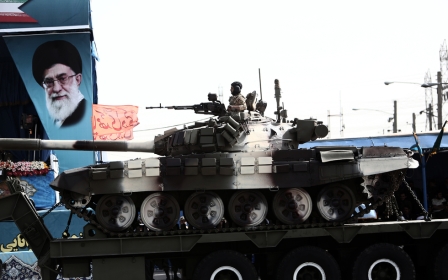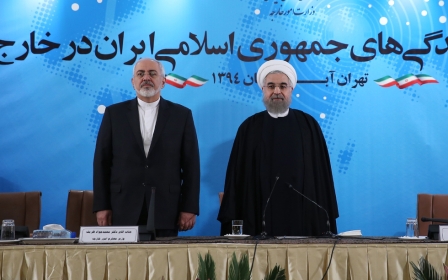Iran’s fictional moderates: A horrifying reality

As the Iranian people continue to suffer under a religious dictatorship, many in the oppressive leadership are still unjustifiably being dubbed as “moderates”.
Those who are convinced that there are "moderates" within the Islamic Republic of Iran establishment who can reform it should perhaps be branded wilfully ignorant, particularly given last week’s events.
The selection of hardliner Ahmad Jannati to chair the Assembly of Experts, the body which elects the supreme leader, seems a bold message from Tehran to the rest of the world not to keep hopes of such moderation high. This is despite the expectations that were raised following national election results in February, which affected the body's composition and were depicted by some as a victory for "moderates".
Jannati's chairmanship ensures that during a future election of a new supreme leader the ultra-conservatives will dominate the process and select a candidate who adheres entirely to the principle of guardianship of the Islamic jurist (Velayat-e Faqih). Furthermore, by embracing Jannati, who is known for his anti-Western sentiments, as the new head of the Assembly of Experts, the clerical establishment effectively expresses its true intention, which is far from changing relations with the West.
The term "moderation" has little meaning in Iran, where the supreme leader, Ali Hosseini Khamenei, has the final say on all matters in the country. In the lead-up to so-called presidential elections in June 2013, which saw Hassan Rouhani assume the presidency, Western officials were quick in releasing statements that underlined their willingness to engage directly with a new "reformer," although at the time the UK Foreign Office also took the opportunity to remind Rouhani of his obligation to "improve the political and human rights situation for the people of Iran".
Three years into Rouhani's presidency and human rights groups have raised alarm bells regarding rights violations under his tenure. According to the UN special rapporteur on Iran, "at least 966 persons - the highest rate in over two decades - were executed in 2015," including alleged juvenile offenders, thereby distinguishing Iran as the world's top executioner of children and as the country which has the world's highest per capita execution rate.
Amnesty International reported in its Iran 2015/16 brief: "The authorities severely curtailed the rights to freedom of expression, association and assembly, arresting and imprisoning journalists, human rights defenders, trade unionists and others who voiced dissent, on vague and overly broad charges."
Last week, the Iranian authorities once again reaffirmed their medieval nature by flogging 35 young men each with 99 lashes because they were holding a graduation party in Qazvin, north of Tehran.
Under "moderate" Rouhani, Iran has been recognised as the world's biggest prison for women journalists in 2016, and the leadership continues to systematically violate the rights of women and minority groups. Those who stand up against repression face heavy repercussions, as demonstrated last month when authorities sentenced the already-imprisoned renowned human rights activist Narges Mohammadi to serve 10 years of a 16-year prison sentence.
The leadership unashamedly fabricated new charges against Mohammadi due to her campaign against the death penalty and for having in March 2014 met with Catherine Ashton, the then European Union's High Representative for Foreign Affairs and Security Policy, in the Austrian embassy in Tehran.
The Iranian leadership has also stepped up its cyber warfare, seeking to accomplish its domestic and foreign policy objectives through its cyber arsenal. In the past, prior to the Iranian revolution of 1979, Ruhollah Khomeini, the late founder of the Islamic Republic, and his adherents did not shy away from using the then modern day technology while in exile in order to steer events in Iran against the repressive leadership of the Shah.
Khomeini, who recognised the power of technology, recorded his messages on cassette tapes and video tapes which his followers would smuggle into Iran distributing them among the people in the hope of achieving grassroots mobilisation for his cause, aiming to ultimately tighten his grip on power.
In the current era of evolving mobile technology and the internet, Tehran has identified digital media as a serious threat to the establishment and thus formed a cyber army under the command of the Islamic Revolutionary Guard Corps (IRGC), using technology as a tool in order to pursue its reactionary agenda.
To this end, the IRGC's Centre for Investigation of Organised Cyber Crimes (Gerdab) runs a surveillance programme entitled "Operation Spider 2," which effectively tracks and cracks down on social media users and has so far resulted in the arrest and imprisonment of netizens on charges such as "insulting Islam," "publishing immoral and corrupt material," and "encouraging individuals to commit immoral acts".
According to Reporters Without Borders, during Rouhani's tenure a total of 100 online commenters have been arrested and imprisoned by the intelligence services of the IRGC. Just last month, the IRGC cyber-crimes unit cracked down on Iran's fashion industry by arresting seven of the country's leading models on charges of "promoting Western promiscuity" for posting on social media sites pictures of themselves without a headscarf.
Given these domestic realities in Iran, where brutal repression of the population by the authorities has continued unabated, it does not require strenuous effort to comprehend that what the Iranian people are subject to can in any way be equated with moderation. Perhaps by labelling Rouhani and his cabinet as "moderates" or "reformers" the leaders of the international community attempt to justify engagement with a leadership that has a grim human rights record and is recognised as the leading state sponsor of terrorism.
As Iran agreed to curb its nuclear programme in return for the lifting of international sanctions following negotiations in July 2015 with the five permanent members of the UN Security Council plus Germany, the latter felt optimistic that Iran would become part of the world community again.
However, Tehran appears to be unmoved and is rather more concerned with upholding its "revolutionary" credentials than living up to the expectations that were raised following Rouhani's charm offensive in the wake of his tenure. The mullahs continue to prop up the leadership of Bashar al-Assad in Syria, thereby prolonging the five-year old conflict which has resulted so-far in an estimated death toll of 400,000 and created the greatest refugee crisis since the Second World War.
They remain steadfast in their support for Shia militias in Iraq, who under supervision of Quds-Force operatives commit atrocities with impunity against the local population. Furthermore, Tehran continues to destabilise the region by sending weapon shipments destined for Houthi forces in Yemen and by testing intercontinental ballistic missiles, thereby violating UN Security Council resolutions.
Moreover, Iran's increasing sophistication in cyber warfare constitutes a grave danger to the infrastructure of its adversaries and as it has demonstrated in the past, it is capable and willing to sabotage their facilities.
Instead of condoning the activities of the leadership in Tehran, which jeopardise global peace and security, the time is ripe for the international community to recognise what the mullahs' leadership really is - a religious tyranny which brutally represses the masses internally and remains determined in creating havoc externally. In truth, there is nothing moderate about it.
-Mosa Zahed is the founding director of the London-based Middle East Forum for Development. He operates as a foreign policy and security adviser to parliamentarians of E.U. member states and has spoken at many parliamentary committee meetings in the United Kingdom and the Netherlands on human rights violations. Zahed has extensive experience working with non-governmental and intergovernmental organisations. You can follow him on Twitter @Mosazahed
The views expressed in this article belong to the author and do not necessarily reflect the editorial policy of Middle East Eye.
Photo: Iranian President Hassan Rouhani (C) salutes during an opening ceremony of fifth Assembly of Experts meeting in Tehran, on 24 May 2016 (AA).
Stay informed with MEE's newsletters
Sign up to get the latest alerts, insights and analysis, starting with Turkey Unpacked
Middle East Eye delivers independent and unrivalled coverage and analysis of the Middle East, North Africa and beyond. To learn more about republishing this content and the associated fees, please fill out this form. More about MEE can be found here.





